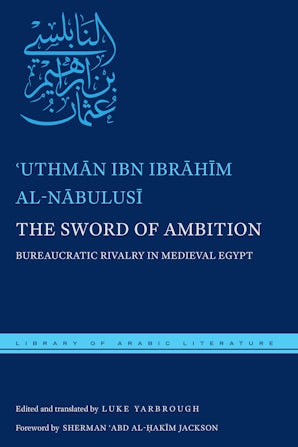
The Sword of Ambition
Bureaucratic Rivalry in Medieval Egypt
478 Pages
May 2016
ISBN: 9781479889457
The Sword of Ambition belongs to a genre of religious polemic written for the rulers of Egypt and Syria between the twelfth and the fourteenth centuries. Unlike most medieval Muslim polemic, the concerns of this genre were more social and political than theological. Leaving no rhetorical stone unturned, the book’s author, an unemployed Egyptian scholar and former bureaucrat named 'Uthman ibn Ibrahim al-Nabulusi (d. 660/1262), poured his deep knowledge of history, law, and literature into the work. Now edited in full and translated for the first time, The Sword of Ambition opens a new window onto the fascinating culture of elite rivalry in the late-medieval Islamic Middle East. It contains a wealth of little-known historical anecdotes, unusual religious opinions, obscure and witty poetry, and humorous cultural satire. Above all, it reveals that much of the inter-communal animosity of the era was conditioned by fierce competition for scarce resources that were increasingly mediated by an ideologically committed Sunni Muslim state. This insight reminds us that seemingly timeless and inevitable “religious” conflict must be considered in its broader historical perspective.
The Sword of Ambition is both the earliest and most eclectic of several independent works composed in medieval Egypt against the employment of Coptic and Jewish officials, and is vivid testimony to the gradual integration of Islamic scholarship and state administration that was well underway in its day.
A bilingual Arabic-English edition.
Reviews
-
"Luke Yarbrough is to be congratulated for a very fine piece of philological scholarship combining [a] first-class edition with a wonderful translation."
— Bulletin of the School of Oriental and African Studies
-
"Avery reader-friendly modern English version of this mediaeval Arabic text . . .Yarbrough's informative introduction usefully situates the book both in its own time and in terms of the later uses that have been made of it. . .Yarbrough's fine translation allows the contemporary English-speaking reader to hear the full range of its author's wheedling, monomaniacal voice."
— al-Ahram
-
"An amazing narrative that combines erudition, poetry, belles lettres, history, law, and anecdotal accounts into a compelling work."
— Islamic Sciences
-
"[An] elegant and well-edited bilingual edition."
— Times Literary Supplement
-
"Luke Yarbrough has done the field of medieval Middle Eastern history a service... [An] excellent edition and exemplary translation."
— Journal of the American Oriental Society
eBooks
Exam Copy
Please list your name, institutional affiliation, course name and size, and institution address. NYU Press will cancel exam copy orders if information cannot be verified.

